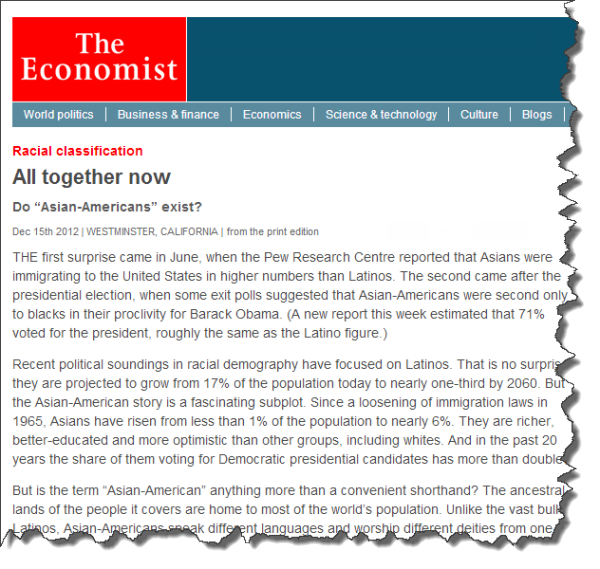EDITOR’S NOTE: Johnny C previously wrote Asian America: Confusion from Within, Abroad, and Why, inspired by the same Economist article. –Joz
White. Black. Asian. Common words that are used to define a person’s ethnic background in a very crude way, but perhaps they hold more water than the term “Asian American”. One denotes a supposed ethnicity, the other denotes nationality, but is it right to categorize such a major group of diverse people under the one umbrella? Take the analogy of African Americans. Some are actually “African” and living in America, some are African in origin and actually “American”. Is there really a difference? Do you distinguish them by the clothing, looks or social attitude?
Racial Classification has always been a messy issue. Too specific, and you run the risk of either being accused of racism or getting entangled up in too many different groups of people. Too general and it defeats the purpose of classification. Moreover, is the term “Asian American” even able to accurately define the supposed people it represents? The Economist questions this created identity and its implications for America, particulary considering the rate of immigation compared to other groups (higher than Latinos) and the percentage of support that those in this group gave to Barack Obama. However, it was Eric Liu, Chinese-American author and former adviser to Bill Clinton that summed it best, as a “classically American invention” that gives perceived power by virtue of numbers to a group of people. It won’t be long before candidates and parties will begin surveying and actively targeting Asian Americans as a defined group of people to garner votes and political support and donations.
I believe that having a unified term is far more powerful than having several different identities of different ethnic groups. Sure, use terms like “American Chinese” or “Vietnamese American ” or “Korean American” or “Japanese American” or whatever, but the fact remains that any one singular ethnic group by itself at this stage is too weak to be able to effectively make changes. Sure, we have differences. We’re not the same. But it seems that as a whole, we’re far more focused on our individual ethnic identities and not enough on the collective good that a singular identity gives to us. I know that some of us are fiercely protective of our racial identity, that we choose to actively use specific terms rather than generic terms. There are two reasons why this is detrimental in the long run.
First, the reason why we are “Asian Americans” is because no matter the ethnic background, we are Americans first but we hold a collective power to advocate for all people who are Asian. Where we splinter and fail to rally for other groups facing the same problems, we end up rending our efforts useless.
Second, Asians have not had a good reputation stemming due to several reasons. Whether it’s the fact that military intervention has been necessary on several occasions in many countries, where as Asian countries have never sent troops to intervene in Europe/America to the perceived less manliness and cowardice of Asian men and promiscuity of Asian women with non-Asian men, overturning misguided racial perceptions start with actively forging a network of people across the spectrum to fight against it.
Take pride in your racial identity but take even more pride in the fact that you are part of greater group of people that are, in the words of the Economist, “richer, better-educated and more optimistic than other groups, including whites”. Actively change the social perception through your individual actions and we will change the way people see us.









